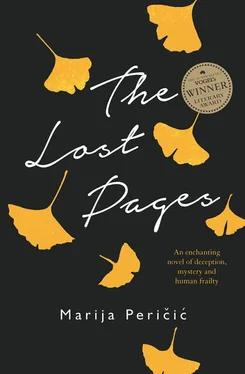I had to see Anja. I packed my clothes and hesitated before the pile of travelogue notes. [16] These notes were located among the manuscripts. They are unremarkable, and written in a shorthand style. Their content mostly paraphrases the information that appears in the 1905 Baedeker.
In the end I took them, thinking that it would not take me long to write them up. I took out a sheet of notepaper to write to Franz, but I could think of nothing to say. In the end I left it there, blank, a square of white on the table’s surface.
ON THE TRAIN, WITH KARLSBAD RECEDING INTO THE DISTANCE, I felt an immense sense of relief. I opened the window of the compartment wide and stood up to better breathe in the clean air, to rid my lungs of the sulphurous fumes that I knew still lingered there, and in my hair and on the tips of my fingers. I watched the wooded hills speed past. My head was clearer and my whole body felt clean and true, like an arrow being shot from a bow, sure of the target. If I am honest with myself, I was also relieved to be returning home because it would allow me to peel myself out from under the heavy shadow of Franz. Although the anonymity at Karlsbad had the benefit of concealment, I realised as soon as my feet were back on the streets of Prague that I much preferred to be recognised, even though this meant that I lived with the weight of the world’s appraising eyes on me.
Prague was bathed in sun and the droplets of a recent shower, and the stones of the familiar streets and buildings were softened and gathered tight around me like an embrace. On the train I had been planning to go directly to Anja’s house, but on catching sight of myself in the compartment window I decided to return home first, to wash and change my clothes.
Even so I could not help taking the route that passed Anja’s house, and as I turned into the Martinsgasse my heart quickened in my chest. I walked on the opposite side of the street to her house, to be able to see it more easily. The thought that Anja was only a few metres distant from me, separated perhaps by only a pane of glass and the thickness of a curtain, calmed me. I imagined her sitting in her room, brushing her hair, or talking with her mother, drinking tea. My sense of urgency evaporated. It occurred to me that my formulations of the previous night might have been paranoid. The whole thing was probably nothing more than a misunderstanding. In the sparkling light of my beautiful city, all the anxieties of the time at Karlsbad shrank and became nothing more significant than an unpleasant dream.

Although I had intended to call on Anja on the day of my arrival, I did not make the visit until a few days later. When I returned home I found that I had many responsibilities requiring my attention: I had work waiting for me at the post office, and Theodor, who had somehow already got wind of my return, was demanding explanations. I began to develop a strange, almost superstitious, reluctance to see Anja. I had not seen her for so long that a part of me preferred to keep her in the sure realm of my imagination, where I could control what happened. I began almost to fear meeting with her, an event which would decisively clarify the situation for good or ill.
On the day of my visit to her I dressed with care and made a detour to buy a bouquet from a flower seller. My hands were trembling as I walked up the Martinsgasse. The street was completely deserted and the houses were silent. Everything had an abandoned air, including Anja’s house, when I arrived.
I had to wait a long time for the concierge to open the door and, when he did, it was only to inform me that the Železnýs were not at home, and then slam the door in my face. I stepped back out into the street and looked up at Anja’s curtained windows. I stood for a long time, but the curtains never shifted and the folds of fabric fell across the glass like rolls of iron. I returned home and gave the bouquet to my mother instead.
When I’d left Karlsbad, I had thought that I was leaving Franz behind. I had looked forward to existing once more in my own right, rather than as an appendage to him, but it was not long before I realised that he had followed me here; it was impossible to escape him. He was everywhere in Prague. Everyone was talking about him, his stories appeared in the journals to which I subscribed, friends of mine reviewed the stories in other journals, and people were constantly asking me about him and begging to be introduced.
When I went to see Theodor I found the whole office completely altered. The furniture was new and modern and in a different arrangement, and the workers too had been replaced with new ones. No one recognised me, no one knew who I was, and the head clerk, on glancing at my card, called out to Theodor that Franz’s agent was waiting to see him.
The other strange workers at the office began to bustle in and out of the hall, glancing curiously at me as I sat waiting. I could hear them whispering in the back room, and presently the youngest-looking one came towards me like an envoy, holding out a copy of Franz’s book. He shyly asked me to sign it, which, though slightly puzzled by the request, I did, before realising that he had misunderstood and taken me for Franz.
I felt terribly ashamed when I became aware of my mistake; that I had defaced his book with a nonsensical inscription. After the initial confusion, he also seemed embarrassed, and, eager to cover his embarrassment with pleasantry, told me that he would simply cut out the page and then paste it into my first book when that was published.
Even in the realm of sleep there was no escape from Franz. His face floated in front of my eyes when I drifted off, and in my dreams I would find it superimposed onto other faces: those of small children playing in the street, my mother’s face, and even my own in the mirror. I began to dread going out lest I be asked yet again about Franz, and I remained sequestered either in my office or at home.
Although it was unpleasant, this enforced isolation ultimately worked in my favour. The weeks had sped past and the deadline for Schopenhauer was almost upon me. Now I could not avoid the many hours of joyless work that awaited me, and I set myself to the task of marshalling my notes into a vague shape to produce something that might make a book. All my optimism at the outset of writing this book had melted away, leaving only a kind of sick fatigue. How I hated Schopenhauer now. I went about the work passionlessly, all of my lofty ideas gone, aiming only to finish it. I set a strict daily quota of two thousand words and mechanically kept to it with no excuses. I finished exactly on the day of the deadline. I sent the papers off to Theodor, but there was none of the usual euphoria of achievement; only a dull sense of relief. That night I fell into bed at six o’clock and slept a blank, anaesthetised sleep.
BY THIS TIME I HAD BEEN BACK IN PRAGUE FOR MORE THAN A month, and Anja’s house still remained empty. I called on her twice a day, on my way to and from the post office, and soon I was such a familiar figure on the Martinsgasse that the concierge stopped even bothering to open the door to me. Instead his grizzled head would appear in the glass panel beside the door and he would peer at out me, frown, and then make an impatient movement with his hand before turning away.
After this silent exchange, I would take up my post on the opposite side of the street and watch the windows of Anja’s apartment. I could not tell you why I did this. I would stare at the pattern of the curtains’ folds until I was hypnotised by them, and then nothing else—not Prague, myself, Franz or even Anja—seemed to exist anymore. Inevitably, just when I had made up my mind to leave, I would imagine that the curtain had moved, or the shadow of a person had appeared at the window, and I would remain there in the street, looking up.
Читать дальше













